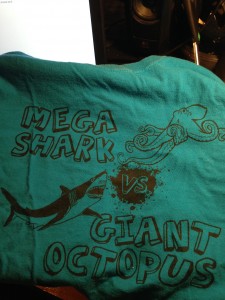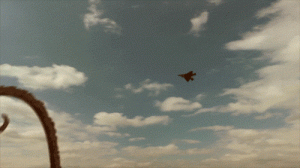My sophomore year at Duke I took Marine Mega fauna and the movie, Mega Shark vs Giant Octopus became a running joke in our class. So much so that on our class field trip we watched the movie and made a T-Shirt (yes…I did design the shirt). When you hear the title, of course the question is how does it end? Spoiler Alert: In the movie, the battle ends in a draw, both animals die. But I feel that if these opponents really met there would be a different outcome. Now that I find myself researching the Giant Pacific Octopus (Enteroctopus dofleini), which happens to be the largest extant octopus species today, and wonder who would win. But based on the best available science who would actually win if Mega Shark did fight Giant Octopus.

First off, the movie suggests that the two creatures fighting are a Megalodont and Tusotutheis, but because they are extinct, the behaviors and actions I suggest will be based on extant sharks and the Giant Pacific Octopus. Emma MacNeil, the female oceanographer in the film suggests that the two would fight when brought into contact because they are natural rivals. However, observations of sharks and octopuses today would suggest otherwise. Sharks are opportunistic predators but most do not feed very heavily on octopuses. This is exemplified by a study found which suggested that of 13 Pacific sleeper shark (Somniosus pacificus) stomach contents that were analyzed, only 5% of the content was from E. dofleini (Yang and Page 1998). Part of this is because of the octopus’s timid nature. Normally, they will stay near their den, and tend to flee from conflict or utilize camouflage to hide (High 1976). Analysis of octopus’s diet suggests that octopus mostly eat bivalves in addition to some crustaceans and small fish (Mather et al 2012). Because of the behaviors in predation and feeding of the two subjects I do not believe a conflict would have naturally arisen.
Although the likelihood of conflict is low, observations have found that octopuses can be aggressive if their den and or territory is threatened (High 1976). If this situation occurred in the movie then we could discuss who may win. In the film, the strength of both the Mega Shark

And the Giant Octopus is demonstrated.

But these demonstrate feats of strength against man, not each other. For a true depiction of what may occur, testimonial from national geographic provides what is to be a likely scenario.
Works Cited
Fuller, N. J., M. S. Fewtrell, O. Dewitt, M. Elia, and JC K. Wells. “Segmental Bioelectrical Impedance Analysis in Children Aged 8-12 Y: 2. The Assessment of Regional Body Composition and Muscle Mass.” International Journal of Obesity 26.5 (n.d.): 692-700. Web.
Hartis, Coleen. “Animal Diversity Web.” ADW: Enteroctopus Dofleini: INFORMATION. University of Michigan, n.d. Web. http://animaldiversity.ummz.umich.edu/accounts/Enteroctopus_dofleini.
Kuemmerle-Deschner, J.b., S. Hansmann, H. Rapp, and G.e. Dannecker. “A New Model for the Determination of Limb Segment Mass in Children.” Gait & Posture 25.4 (2007): 615-19.
“Mega Shark vs Giant Octopus.” IMDb. IMDb.com, n.d. Web. http://www.imdb.com/title/tt1350498
Schneider, Klaus, and Ronald F. Zernicke. “Mass, Center of Mass, and Moment of Inertia Estimates for Infant Limb Segments.” Journal of Biomechanics 25.2 (1991): 145-48.
“Shark vs Octopus.” YouTube. YouTube, 18 May 2007. Web. http://www.youtube.com/watch?v=p9A-oxUMAy8.
“Spiny Dogfish.” , Coastal Waters, Fishes, Squalus Acanthias. Monterey Bay Aquarium, n.d. Web. http://www.montereybayaquarium.org/animals/AnimalDetails.aspx?enc=VsGX Lst7QYFrKIYw3JEKQ.
Völgyi, Eszter, Frances A. Tylavsky, Leiting Xu, Jian Lu, Qin Wang, Markku Alén, and Sulin Cheng. “Bone and Body Segment Lengthening and Widening: A 7-year Follow-up Study in Pubertal Girls.” Bone 47.4 (2010): 773-82. Print.
Wassilieff, Maggy; and O’Shea, Steve (2009) “Octopus and squid – Feeding and predation” Te Ara – the Encyclopedia of New Zealand.
